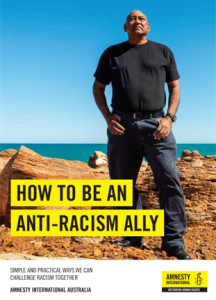The answers revealed
Keep an eye on your phone – we’ll be in touch to send your anti-racism ally guide to you! The guide presents simple and practical advice for all of us, as we strive to better recognise and address racism. We’ve included stories of lived experience and allyship, helpful conversation starters, recommended books, movies and podcasts, ways of taking action, and more.

Question 1: Is Senator Bridget McKenzie’s statement correct? “[26 January] is when the course of our nation changed forever. When Captain Cook stepped ashore.”
Answer: b. No. 26 January actually marks the beginning of British colonisation with the arrival of the First Fleet in 1788 – eighteen years after Captain Cook ‘stepped ashore’ in April 1770. Senator McKenzie is not alone, according to a 2017 survey, one in five Australians believe that 26 January is the anniversary of Captain Cook’s arrival.
Question 2: True or False? Australia is the only country that celebrates the day Europeans invaded as its national day.
Answer: a. True. For example, New Zealand’s national day is a reflective affair centred around Indigenous-state relations, and the United States’ national day marks its independence from the British.
Question 3: For many First Nations People, 26 January is not a day for celebration. Instead of calling 26 January ‘Australia Day’, what other names are commonly used to describe it?
Answer: d. All of the above. 26 January is referred to as Invasion Day, Day of Mourning and Survival Day. For some First Nations People, these names each reflect a different element of what the day means to them.
Question 4: In 2012, the Race Discrimination Commissioner observed that “Sometimes racism can be reflected in not telling the history of an event or the experience of a group of people in our country”. What do we call the process of openly sharing and exposing historical truths?
Answer: c. Truth-telling. We all have a responsibility to learn and understand the true history of invasion, resistance and ongoing colonial violence towards First Nations People. There is also so much positive shared history to celebrate – First Nations People had trade routes, advanced farming techniques and amazing inventions that were thousands of years ahead of their time.
Question 5: What are some ways you can be an ally to First Nations People on Invasion Day?
Answer: e. All of the above. There are many different ways you can show your solidarity with First Nations People on Invasion Day (such as attending your local Invasion Day event or rally, listening to and amplifying the voices of First Nations People, understanding and learning about the history of invasion and calling out racism when you see or hear it). But remember, being an ally doesn’t mean taking action once a year – it’s important to make allyship part of your daily life.
We hope you enjoyed the quiz!
Together, we can challenge racism by raising our voices for a better world, where human rights are enjoyed by all. You are part of a movement defending equality and demanding safety and a fair justice system for all.
From all of us at Amnesty, thank you for embarking on this journey with us as an anti-racism ally. Your support as an ally is changing lives.



